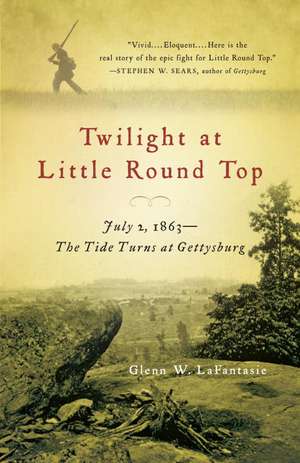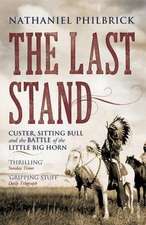Twilight at Little Round Top: The Tide Turns at Gettysburg: Vintage Civil War Library
Autor Glenn W. Lafantasieen Limba Engleză Paperback – 30 sep 2007
| Toate formatele și edițiile | Preț | Express |
|---|---|---|
| Paperback (1) | 99.36 lei 3-5 săpt. | |
| Vintage Books USA – 30 sep 2007 | 99.36 lei 3-5 săpt. | |
| Hardback (1) | 203.89 lei 3-5 săpt. | |
| Wiley – 31 ian 2005 | 203.89 lei 3-5 săpt. |
Din seria Vintage Civil War Library
-
 Preț: 102.62 lei
Preț: 102.62 lei -
 Preț: 107.63 lei
Preț: 107.63 lei -
 Preț: 121.68 lei
Preț: 121.68 lei -
 Preț: 144.52 lei
Preț: 144.52 lei -
 Preț: 109.32 lei
Preț: 109.32 lei -
 Preț: 139.90 lei
Preț: 139.90 lei -
 Preț: 136.71 lei
Preț: 136.71 lei -
 Preț: 136.30 lei
Preț: 136.30 lei -
 Preț: 100.24 lei
Preț: 100.24 lei -
 Preț: 125.54 lei
Preț: 125.54 lei -
 Preț: 134.74 lei
Preț: 134.74 lei -
 Preț: 122.76 lei
Preț: 122.76 lei -
 Preț: 143.78 lei
Preț: 143.78 lei -
 Preț: 133.47 lei
Preț: 133.47 lei -
 Preț: 100.42 lei
Preț: 100.42 lei -
 Preț: 149.08 lei
Preț: 149.08 lei -
 Preț: 116.64 lei
Preț: 116.64 lei -
 Preț: 144.04 lei
Preț: 144.04 lei -
 Preț: 196.43 lei
Preț: 196.43 lei -
 Preț: 115.32 lei
Preț: 115.32 lei -
 Preț: 117.18 lei
Preț: 117.18 lei -
 Preț: 105.40 lei
Preț: 105.40 lei -
 Preț: 198.45 lei
Preț: 198.45 lei -
 Preț: 117.10 lei
Preț: 117.10 lei -
 Preț: 99.14 lei
Preț: 99.14 lei -
 Preț: 98.10 lei
Preț: 98.10 lei -
 Preț: 110.75 lei
Preț: 110.75 lei - 18%
 Preț: 71.23 lei
Preț: 71.23 lei - 16%
 Preț: 80.42 lei
Preț: 80.42 lei -
 Preț: 102.90 lei
Preț: 102.90 lei -
 Preț: 102.69 lei
Preț: 102.69 lei
Preț: 99.36 lei
Nou
19.01€ • 19.90$ • 15.73£
Carte disponibilă
Livrare economică 15-29 martie
Specificații
ISBN-10: 0307386635
Pagini: 315
Ilustrații: 35 PHOTOS & ILLUS.; 7 MAPS
Dimensiuni: 134 x 202 x 18 mm
Greutate: 0.31 kg
Ediția:Reprint
Editura: Vintage Books USA
Seria Vintage Civil War Library
Notă biografică
Extras
Midnight to Morning
Under the pale white light of a full moon, Gettysburg looked nothing like its former self. There was a ghoulish quality to the landscape, and eerie shadows fell across the dead and wounded who remained on the trampled fields where the first day’s fighting had raged. The pungent aromas of death and burnt powder filled the air, and startling military noises—the rumble of caisson wheels on the hard surfaces of the roads, the sudden human shouts of commands and heralds, and the death cries and moans of the wounded who littered the meadows and clogged the town’s alleys and streets—sounded through the night like the jolting peals of a firebell.
At Lee’s headquarters in an apple orchard across from Mrs. Mary Thompson’s tiny but sturdy stone house on the Chambersburg Pike, the commanding general put together his plans for the following day, having already called in Longstreet to discuss an attack on Meade’s left flank “as early . . . as practicable” on the morrow and sent a courier to Ewell with a message not to attack the Union army’s right until he could hear the sound of Longstreet’s artillery to the south. A short while later Lee went to bed, although it could hardly be said that the details of the impending battle had been worked out to perfection.
Longstreet spent a more worrisome night. Late in the afternoon of July 1, as the Confederates drove the Union forces back through the town toward Cemetery Hill, Longstreet had come upon Lee at Seminary Ridge, near the seminary building perched on the crest. Scanning the horizon with his field glasses, Longstreet observed that the Union army was being pushed back toward the high ground, a position that gave the enemy a defensive advantage. To Longstreet’s surprise, Lee said that he intended the following morning to attack Meade’s army on the heights. Longstreet boldly suggested that such a course seemed to be at variance with the plan originally designed for the invasion— that the Army of Northern Virginia would fight a defensive campaign, choosing its own ground if the circumstances warranted.
Lee replied: “If the enemy is there to-morrow, we must attack him.” Longstreet pointed out, “If he is there, it will be because he is anxious that we should attack him—a good reason in my judgment for not doing so.” He urged Lee to move the army around “by our right to the left” of the Army of the Potomac “and put our army between him and Washington, threatening his left and rear, and thus force him to attack us in such position as we might select.” Lee, however, believed that the Confederates could dislodge the Union forces from the high ground and “whip them in detail.” It appeared to Longstreet that the day’s battle had excited Lee and that his desire to strike the enemy “threatened his superb equipoise.”
Longstreet had gained a reputation as a general who favored fighting on the defensive, as he and his corps had so successfully done at Fredericksburg in December 1862, though truth be told he was by nature aggressive and tenacious on the battlefield. Subordinates described how Longstreet would ride headlong into battle “amid a perfect shower of balls,” encouraging his men forward as he chewed on the stump of a cigar. He was a physically imposing man, standing two inches above six feet, brawny in build, with a huge head, auburn hair receding from his broad forehead, piercing blue eyes, heavy brows, high cheekbones, and a long and thick beard that covered his rather cruel mouth. With the death of Stonewall Jackson after Chancellorsville, Longstreet at age forty-two had assumed the mantle of Lee’s most trusted lieutenant, the general whom Lee affectionately called “my old war-horse.”
On the morning of July 2, Longstreet was up by 3:00, having slept only a few hours. In the early morning darkness, he rode under the sparkling stars to meet with General Lee and argue, one more time, that the commanding general should abandon his plan to assault the Union army’s strong defensive line and, instead, move the Army of Northern Virginia to more advantageous ground.
Just before midnight, while the moon rose steadily higher in the sky, General Meade arrived in Gettysburg with his entourage, which included his son and aide-de-camp, Captain George G. Meade, and Brigadier General Henry J. Hunt, his artillery chief. Meade quickly found General Howard and asked, rather brusquely: “Well, Howard, what do you think, is this the place to fight the battle?” Howard and the other officers assured him that they could hold their position against a Confederate attack. “I am glad to hear you say so, gentlemen,” Meade replied. “I have already ordered the other corps to concentrate here and it is too late to change.”
Later he looked over the entire length of the Union lines with Howard and Hunt. He may have been relieved to discover that two regiments— the 5th Ohio and the 147th Pennsylvania—from Brigadier General John W. Geary’s Second Division of the Twelfth Corps had, sometime just before dark on July 1, occupied the slopes of Little Round Top, the eye of the Union army’s fishhook line. Between the hill and the left flank of Major General Daniel E. Sickles’s Third Corps, two other brigades from the Twelfth Corps—those commanded by Colonel Charles Candy and Brigadier General George S. Greene—filled the gap in the shank of the Union line, where Cemetery Ridge melted into the lower ridge of Little Round Top. But mostly Meade’s attention was fixed on the right of his line, Culp’s Hill and Cemetery Hill, where he knew the Confederate forces had been massed in what certainly appeared to be a firm intention of the enemy to storm the Union works on those hills.
After daybreak, Meade established his headquarters on the Taneytown Road in a small white cottage owned by a widow, Mrs. Lydia Leister. Almost at once, the tiny house became a beehive of activity as Meade worked feverishly to ensure the proper placement of his corps; as daylight came over the land, Union troops flowed down the narrow roads and spread like a blue ink stain across the fields and hills and ridges south of Gettysburg.
It was late in the afternoon of July 1, while the fighting still raged around Gettysburg, that Major General John Bell Hood, who commanded one of the three divisions in Longstreet’s First Corps, received orders to move his men east from their bivouac outside of Chambersburg and on toward Gettysburg. In Hood’s division, the Texans in the brigade commanded by Brigadier General Jerome B. Robertson, “lazily and plethorically” moved in column, as one private in the 4th Texas reported. Marching toward the sound of the guns, the Texas brigade—which consisted of the 1st Texas, 4th Texas, 5th Texas, and 3rd Arkansas regiments—passed a field hospital, where the wounded of the first day’s fighting were receiving medical treatment. “I saw a great many wounded . . . who were mangled and bruised in every possible way, some with their eyes shot out, some with their arms, or hands, or fingers, or feet or legs shot off, and all seeming to suffer a great deal”—so remembered Private John C. West of Company E (“Lone Star Guards”), 4th Texas Infantry, the only married man to serve in his entire company.
West differed from his comrades in Company E in other respects as well. He was a former schoolteacher who had joined the 4th Texas in May 1863, so he had yet to see action as he marched with the men of his company along the moonlit Chambersburg Pike toward Gettysburg. Nor was he a native Texan, like most of the men in Company E and in the regiment. He was born in Camden, South Carolina, on April 12, 1834, where he demonstrated his ability as an apt student and a quick learner. Twenty years later, he was graduated from the University of South Carolina, and the following year, he moved to Austin, Texas, where his brother Charles, an attorney, resided. While he read law in Charles’s office, he also taught school. He returned to South Carolina in 1856 to marry Mary E. Stark of Columbia, and the couple set up their household outside Austin. In 1859, after passing the bar, he moved with his wife to Waco, where he became the headmaster of the Waco and Trinity River Classical School.
When the secession crisis drove Texas out of the Union, West sided with the Confederacy and condemned Governor Sam Houston for taking a stand against disunion. Showing his commitment to the Southern cause, he enlisted in a local militia company, the Lone Star Guards, but he served in the unit only a short time. In May 1861, President Jefferson Davis named him district attorney for the Western District of Texas. Less than a year later, West resigned his position and enlisted in the newly recruited 15th Texas Infantry. But he served with the regiment only a few weeks in March 1862 and transferred to Company K of the First Regiment of Texas Heavy Artillery. In July 1862, he was appointed district attorney again, and he reluctantly accepted the office and left the military. He remained in that position until the following April, when he enlisted in the 4th Texas and managed, as luck would have it, to find a place in his former company, the Lone Star Guards.
Although his friends and neighbors urged him not to go for a soldier, West was determined to “see a fight” and “remain in the ranks, if necessary, until the close of the war.” In the early spring of 1863, he left his wife and two small children—a boy, Stark, and a girl, Mary —in Waco and set off with a Bible in his carpetbag, an overcoat, and a blanket to join the 4th Texas with Lee’s army in Virginia. With his blue eyes, fair complexion, and light hair (already starting to thin on the top), he looked like a robust Viking off to seek adventure and glory. But West was no Scandinavian warrior; he was a sober Christian soldier. He had just turned twenty-nine years old.
It took him nearly a month to catch up with the regiment in May 1863, encamped on the Rapidan after the battle of Chancellorsville. Along the way, traveling through the heart of the Confederacy, he noticed that “more than two-thirds” of the women he saw were dressed in black. Although he could not know what combat was really like, he enjoyed the bravado expressed by his comrades: “We can’t be whipped, but we may all be killed.” But the sight of those women dressed in black was a picture he could not erase from his mind.
Hood’s division plodded along the Chambersburg Pike and followed the winding road that led over South Mountain and into Cashtown, a small crossroads about eight miles west of Gettysburg. Although rumors flew about the battle being fought at Gettysburg, the 4th Texas could not know precisely where it was going or what it was expected to do. “We never know anything,” West admitted in an earlier letter home. Like his comrades, West carried about twenty or thirty pounds of baggage and equipment on his back. Along with his musket, cartridges, and canteen, he also carried his trusty Bible, an extra pair of underwear, and a daguerreotype of his wife, Mary, which he gazed upon daily without fail. Every time he looked at her picture, he said, he remembered Jeremiah 49:11—“Leave thy fatherless children, I will preserve them alive; and let thy widows trust in me.”
Sometime after midnight, Hood’s division reached Marsh Creek, only two or three miles west of Gettysburg, but around 3:00 a.m., Hood’s gray ranks were back on the Chambersburg Pike, groping forward in the black hours before dawn, until they reached the fields below the western slope of Seminary Ridge, where they halted in the cheerless light of day to receive orders—orders that did not come for several hours. Standing in line, exhausted beyond strength, West fell asleep on his feet and dreamed of his little son, four years old, and his wife and daughter, “and I asked God to take care of you if I am taken away from you.”
The word ran through the blue columns like wildfire: McClellan was back in command of the Army of the Potomac! Major Ellis Spear of the 20th Maine Infantry was less impressed with this news than the men in the ranks seemed to be. As far as Spear was concerned, General George B. McClellan had been a disaster for the Army of the Potomac, and he did not relish the thought of serving in an army under a man who had demonstrated a peculiar inability to win victories. Luckily for Spear, and for the army as a whole, the rumor proved false. So he and his comrades silently trudged forward into the blackness of the night.
Spear’s regiment had been marching since the morning of July 1, when it left Union Mills, Maryland, and followed a twisting little road that ran up and over countless swales and ridges to Hanover, Pennsylvania. The 20th Maine was brigaded with the 83rd Pennsylvania, the 44th New York, and the 16th Michigan, in the Army of the Potomac’s First Division, Third Brigade, led by a dashing and handsome young officer, Colonel Strong Vincent of Erie, Pennsylvania. Commanding the 20th Maine was another energetic officer, Colonel Joshua Lawrence Chamberlain, a former professor of rhetoric at Bowdoin College in Brunswick, Maine. Spear, in fact, had been his student at the college. Chamberlain received command of the 20th Maine in May, after the regiment’s previous commander, Adelbert Ames, accepted a promotion to brigadier general. Spear liked Chamberlain and trusted him. He described him as “a gentleman and a scholar[,] and although he was also without military knowledge or experience[,] he was a man of such intelligence and urbanity and kindliness of feeling that he exerted a useful influence” over the men.
Chamberlain alone did not positively influence the men of the 20th Maine. Major Spear, a former schoolteacher who had been studying law when the war broke out, worked arduously in the summer of 1862 to raise the regiment, in response to Abraham Lincoln’s call for three hundred thousand more volunteers in the North and Governor Israel Washburn’s decision to authorize the formation of the 20th Maine as one of four new regiments that state would offer up to the nation. Although born in Warren, Maine, Spear recruited men from Wiscasset and its environs, joined forces with other recruiters in the area, and put together an entire company that the governor assigned as Company G, 20th Maine, appointing Spear as its captain.
Recenzii
—Stephen W. Sears, author of Gettysburg
“Fascinating. . . . An eloquently written narrative. . . . A fine example of military and social history.”
—The Civil War News
“A gem. . . . LaFantasie’s beautifully written narrative goes beyond the movement of troops to provide an understanding of who the men were who fought there...and how the grim afternoon shaped their lives.”
—America’s Civil War
“Lively. . . . Readable. . . . There is something weirdly magical about [Little Round Top] and it has lacked a definitive history until now.” —The Journal of Southern History
Textul de pe ultima copertă
"Here is the real story of the epic fight for Little Round Top, shorn of the mythology long obscuring this pivotal Gettysburg moment. A vivid and eloquent book." -- Stephen W. Sears, author of "Gettysburg"
"Little Round Top has become iconic in Civil War literature and American memory. In the emotional recollection of our great war, if there was one speck on the landscape that decided a battle and the future of a nation, then surely this was it. The story of the July 2, 1863 struggle for that hill outside Gettysburg goes deeper into our consciousness than that, however. The men who fought for it then and there believed it to be decisive, and that is why they died for it. Glenn W. LaFantasie's "Twilight at Little Round Top" addresses that epic struggle, how those warriors felt then and later, and their physical and emotional attachment to a piece of ground that linked them forever with their nation's fate. This is military and social history at its finest." -- W.C. Davis, author of "Lincoln's Men" and "An Honorable Defeat"
"Few military episodes of the Civil War have attracted as much attention as the struggle for Little Round Top on the second day of Gettysburg. This judicious and engaging book navigates confidently through a welter of contradictory testimony to present a splendid account of the action. It also places events on Little Round Top, which often are exaggerated, within the broader sweep of the battle. All readers interested in the battle of Gettysburg will read this book with enjoyment and profit." -- Gary W. Gallagher, author of "TheConfederate War"
"In his beautifully written narrative, Glenn LaFantasie tells the story of the battle for Little Round Top from the perspective of the soldiers who fought and died in July 1863. Using well-chosen quotes from a wide variety of battle participants, TWILIGHT puts the reader in the midst of the fight-- firing from behind boulders with members of the 4th Alabama, running up the hillside into battle with the men of the 140th New York, and watching in horror as far too many men die. This book offers an elegy to the courage of those men, a meditation on the meaning of war, and a cautionary tale about the sacrifices nations ask of their soldiers and the causes for which those sacrifices are needed." -- Amy Kinsel, Winnrer of the 1993 Allan Nevins Prize for "From These Honored Dead: Gettysburg in American Culture"















